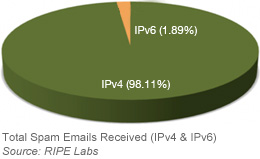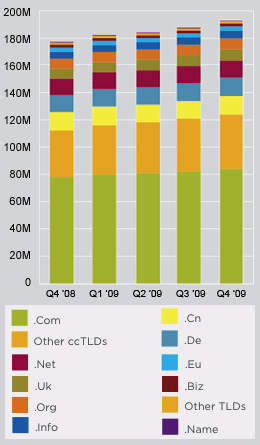

Joly MacFie writes: Last October the NYC Department of Information Technology & Telecommunications (DoITT) issued a request for proposals for "services to obtain, manage, administer, maintain and market the geographic Top Domain name .nyc.". At ICANN's recent 37th meeting in Nairobi, consensus was reached on the "overarching" issue of intellectual property protection. This leaves only the issue of the final (4th) draft of the Applicants Guidebook, expected before the 38th meeting in Brussels in June 2010... more
 A study conducted by RIPE Labs indicates that about 1.89% of spam are received over IPv6. "With the increased deployment of IPv6, we were curious to see how much the amount of spam sent over IPv6 increases. We looked at the e-mail system of the RIPE NCC and produced some statistics that could be seen as an indication for the overall trend of spam sent over IPv6," says RIPE in a blog post explaining the analysis. Group also notes that the study was based on one week’s worth of data and that it excluded messages already rejected by blacklisting and greylisting. more
A study conducted by RIPE Labs indicates that about 1.89% of spam are received over IPv6. "With the increased deployment of IPv6, we were curious to see how much the amount of spam sent over IPv6 increases. We looked at the e-mail system of the RIPE NCC and produced some statistics that could be seen as an indication for the overall trend of spam sent over IPv6," says RIPE in a blog post explaining the analysis. Group also notes that the study was based on one week’s worth of data and that it excluded messages already rejected by blacklisting and greylisting. more
Neil Schwartzman writes: Steven R. Chabinsky, Deputy Assistant Director, Cyber Division of the Federal Bureau of Investigation gave a keynote at the GovSec/FOSE Conference in Washington, D.C., March 23, 2010. Full text of the speech here. more
Google has received over 1,100 community requests in response to their up coming experimental, "ultra high-speed broadband networks," according to the company. Google plans to announce their target communities by the end of the year. "Of course, we're not going to be able to build in every interested community -- our plan is to reach a total of at least 50,000 and potentially up to 500,000 people with this experiment," says Google's Product Manager, James Kelly, in a blog post. more
A recent study by Symantec Norton and Sperling's Best Places has ranked 50 cities in the United States by "Riskiest Online Cities". The study included investigation of a number of factors including... more
 Earlier this year Google made the announcement that it is reviewing its business operations in China and considering possible closure due to China's cyberattacks and limits on free speech. Google today stopped censoring its search services (Google Search, Google News, and Google Images) on its chinese website, Google.cn and users visiting Google.cn are now being redirected to Hong Kong's site, Google.com.hk. more
Earlier this year Google made the announcement that it is reviewing its business operations in China and considering possible closure due to China's cyberattacks and limits on free speech. Google today stopped censoring its search services (Google Search, Google News, and Google Images) on its chinese website, Google.cn and users visiting Google.cn are now being redirected to Hong Kong's site, Google.com.hk. more
Or at least majority of 895 technology stakeholders' and critics' that were recently surveyed by the Pew Research Center's Internet & American Life Project and Elon University's Imagining the Internet Center. Some of the quantitative results from the expert group include the following... more
 ICANN CEO, Rod Beckstrom, urges African leaders to "shatter" telecommunications monopolies in their nations in order to help lower the price of Internet access to their citizens during his opening remarks at the start of the 37th ICANN meeting in Nairobi, Kenya. Beckstrom noted that while 15 percent of the world's population lives in Africa, Africans make up less than 7 percent of all Internet users. more
ICANN CEO, Rod Beckstrom, urges African leaders to "shatter" telecommunications monopolies in their nations in order to help lower the price of Internet access to their citizens during his opening remarks at the start of the 37th ICANN meeting in Nairobi, Kenya. Beckstrom noted that while 15 percent of the world's population lives in Africa, Africans make up less than 7 percent of all Internet users. more
John Yunker co-founder of Byte Level Research and author of The Web Globalization Report Card writes: "The big story this year is that Facebook and Google finished in a numerical tie. But because Google supports more languages (for now), it edged out as the winner. ... Even as we look across all 225 web sites, the number of languages continues to increase. Although the rate of language growth slowed over the past two years -- due in large part to the global recession -- growth continues. This year, the average number of languages increased to 22, up from 20 languages in 2008." more
The highest court in Germany has ruled against telephone and email data retention used to track criminal networks. Melissa Eddy of the Global and Mail reports: "A law ordering data on calls made from mobile or landline telephones and e-mail exchanges be retained for six months for possible use by criminal authorities violated Germans' constitutional right to private correspondence, the Federal Constitutional Court ruled. In its ruling, the court said the law failed to sufficiently balance the need for personal privacy against that for providing security."
more
According to recent study conducted by Minds + Machines, historical data analysis suggests brand owners do not necessarily register their brands when it comes to new generic Top-Level Domains. From the report: "A survey of the domain registration behavior of Fortune 100 companies reveals that they have not registered many of their trademarks in recently created generic top-level domains (gTLDs). A sample of 1043 brands were registered in less than 30% of the eight new open gTLDs created after 2001. If historical registration data is a guide, brands are unlikely to undertake many defensive domain name registrations in the proposed new gTLDs, and furthermore are unlikely to be the victims of cybersquatting." more
CENTR is the Council of European National Top Level Domain Registries, gathering more than 50 registries such as DENIC for Germany (.de), Nominet for the United Kingdom (.uk) or Switch for Switzerland (.ch). The election took place during CENTR's General Assembly held in Warsaw on February 25 and 26. Mathieu Weill, AFNIC's CEO, replaces Andrzej Bartosiewicz, from the Polish registry, NASK, whose term was coming to an end. more
Leading US ISP, Comcast, has announced today its aggressive plans to deploy DNSSEC through out its netowrk. Chris Griffiths, Manager of DNS Engineering, writes: "We plan to implement DNSSEC for the websites we manage, such as comcast.com, comcast.net and xfinity.com, by the first quarter of 2011, if not sooner. By the end of 2011, we plan to implement DNSSEC validation for all of our customers." more

New domain name registrations in the fourth quarter of 2009 reached 3.7 million domain name registrations per month totaling close to 11 million new domain name registrations across all of the Top-Level Domains (TLDs) in the last quarter of 2009, according the latest Domain Name Industry Brief by VeriSign. "The base of country code Top-Level Domain Names (ccTLDs) rose to 78.6 million domain names, a three percent increase quarter over quarter and a 10 percent increase year over year. In terms of total registrations, .com continues to have the highest base followed by .cn (China), .de (Germany), .net and .uk (United Kingdom)." more
Minds + Machines reports: "A quantitative analysis of UDRP data for all open generic Top-Level Domains (gTLDs) concludes that the introduction of new gTLDs will result in approximately 316 new cases of cybersquatting, and that the resultant cost to trademark holders, overall, will be $870,000 per year -- less than less than $.10 for each trademark registered worldwide, or about $.44 per trademark registered in the United States. The data show that cybersquatting correlates to registration volume across all open gTLDs, not to the number of gTLDs, but is more prevalent in .com." more
Sponsored byWhoisXML API

Sponsored byVerisign

Sponsored byIPv4.Global

Sponsored byVerisign

Sponsored byDNIB.com

Sponsored byCSC

Sponsored byRadix
